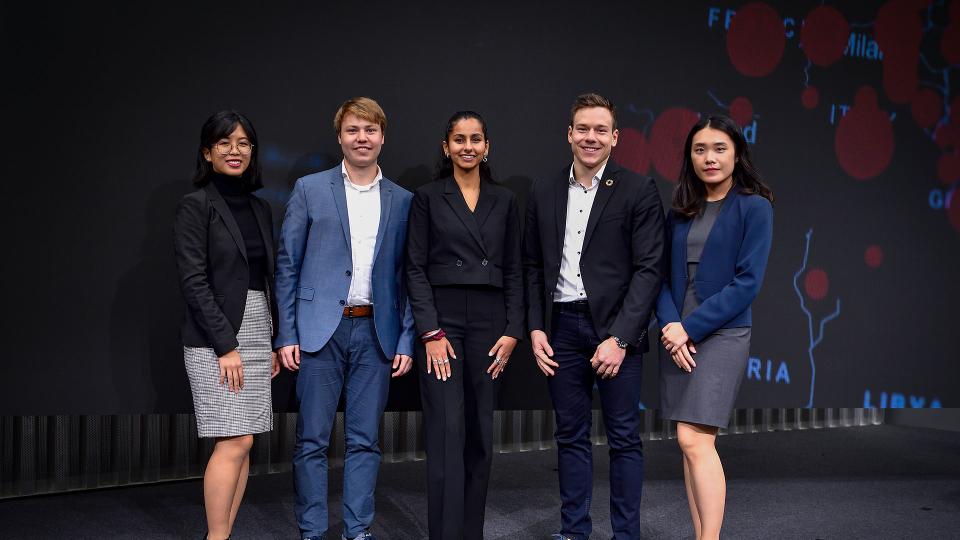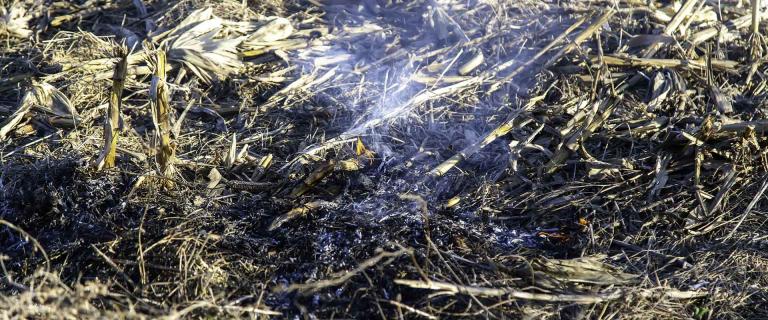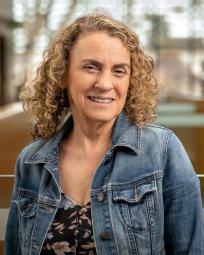
Pictured here from left to right Project BuyBy team members Elaine Lac, Stefan Faistenauer, Veenu King, Maximilian Schubert and Yiwei (Viviana) Li.

YSE students win international prize for new digital app that allows farmers to sell crop byproducts instead of burning them.
The burning of residual agricultural crop stubbles to clear debris for a new harvest is a significant driver of air pollution, soil degradation and climate change. The practice constitutes more than one-third of the global emission from biomass incinerations. In developing and emerging economies, it makes up more than 60% of all biomasses burnt. Yet farmers don’t often have the money to buy crop-clearing equipment and burning is cheap and quick.
But now, thanks to a team of primarily Yale School of the Environment students, there is a tool which can help farmers find viable alternative to burning harvest byproducts. Veenu King ’22 MEM, Elaine Lac ’22 MEM, Maximilian Schubert ’22 MEM as well as Yiwei Li SOM ’22, and Stanford School of Engineering student Stefan Faistenauer developed a centralized marketplace app to connect farmers with buyers who can use crop byproducts for resources.

Pictured here from left to right Project BuyBy team members Elaine Lac, Stefan Faistenauer, Veenu King, Maximilian Schubert and Yiwei (Viviana) Li.
The digital marketplace platform, dubbed BuyBy, earned the YSE team first place in the Geneva Institute’s 2021 Geneva Challenge.
The app is based on the concept of the circular economy and industrial symbiosis, where waste products are reused and becomes valuable commodities in the marketplace.
“We hope to revolutionize the way agriculture is performed in developing countries by making byproducts a part of the financial equation,” Schubert says.
We hope to revolutionize the way agriculture is performed in developing countries by making byproducts a part of the financial equation.”
The students presented their innovation at the Geneva Institute’s annual challenge in Switzerland in November. The annual competition invites graduate students from all over the world to develop projects that find solutions to advance sustainable development goals. The Yale students competed against 83 entries submitted by 333 students across the globe.
In awarding the prize, the Geneva Challenge judges told the team that the project didn’t just address one sustainable development goal, but was a “win, win, win” for the environment, farmers and buyers and the digital platform was well developed and at a stage that it was ready to launch.
“I’m very proud that an intrepid band of Yale industrial ecologists won this prestigious competition through their focus on material reuse that helps farmers while simultaneously reducing CO2,’’ says Marian Chertow, YSE associate professor of Industrial Environmental Management and Director of the Center for Industrial Ecology,
When developing the digital platform, the students focused specifically on the Punjab region of India, where more than 50,000 people die each year from air pollution. At peak times, emissions from the burning of byproducts accounts for 40% of New Delhi’s air pollution. Additionally, stubble burning specifically removes essential nutrients from the soil, requiring reapplications of compost and fertilizer and releases sulfur dioxide that leads to acid rain, which further reduces agricultural productivity, the students noted in their presentation.
But fibers from unburnt stubble could instead be used for sustainable textiles, pulp and paper, dyes, and biofuel. BuyBy, students said, eliminates the middleman between farmers and buyers and allows farmers to set prices for their goods.
“This challenge allowed myself and my team to think about an interdisciplinary solution which would bring about financial, social, and environmental benefits within the specific political and cultural landscape of Punjab, India,’’ says Lac.
Though the marketplace app currently focuses on Punjab, the students say the model is designed to be replicated and scalable.
King says one of the biggest challenges was ensuring the solution to the crop burning issue made sense and that the team engaged with stakeholders in the region.
“This project and the experience itself gave us validation in our ability to be entrepreneurial and in our solution to be necessary and innovative,’’ says King.
The students earned a prize award of about $10,000 for seed money and they are hoping to attract further financial interest with a long-term grant or investment.
“I hope this innovation provides relief to smallholder farmers and enables them to build resiliency in the face of climate change and that this solution can be further applied in regions beyond Punjab,’’ says Lac.
